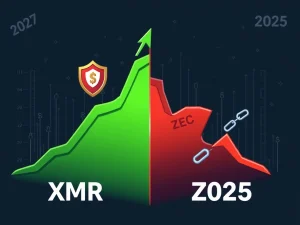XRP’s Breakthrough: Ripple’s Strategic Acquisition of Hidden Road Reshapes Institutional Finance

The world of finance is in constant flux, and few entities are driving change as aggressively as Ripple. Recent announcements from CEO Brad Garlinghouse have sent ripples (pun intended!) through the crypto community, particularly concerning the future of XRP in the high-stakes realm of institutional finance. His ‘Crypto In A Minute’ video, released on July 25, 2025, wasn’t just another update; it outlined a pivotal strategic shift aimed at embedding digital assets directly into prime brokerage services, potentially reshaping the very infrastructure of global finance.
What Does Ripple’s Hidden Road Acquisition Mean for Institutional Finance?
At the core of Garlinghouse’s vision is Ripple’s significant acquisition of Hidden Road, a leading prime brokerage firm. This move is described as a critical step in enabling large-scale institutional investors to engage with crypto assets. But what exactly does this mean, and why is it so important?
- A ‘One-Stop Shop’ for Institutions: Garlinghouse explained that firms like Hidden Road provide a comprehensive service for hedge funds, trading desks, and market makers. This means they can trade digital assets alongside traditional instruments like derivatives and swaps, all within a regulated environment. This simplifies operations for institutions significantly.
- Addressing Key Barriers: Historically, institutional adoption of crypto has been hampered by liquidity constraints and regulatory uncertainty. By integrating XRP and other digital assets into a prime brokerage framework, Ripple aims to alleviate these issues, offering a more stable and compliant pathway for large capital.
- Enhancing XRP’s Utility: The inclusion of XRP within Hidden Road’s platform is designed to boost the token’s utility in institutional portfolios. This could unlock trillions in cross-asset trades, positioning XRP as a key player in global liquidity and settlement.
The Evolution of Prime Brokerage: Why Ripple is Leading the Charge
The financial landscape is witnessing a notable shift. Traditional banks, once the undisputed giants of prime brokerage, are increasingly being displaced by specialized fintech firms. Garlinghouse highlighted that institutions now prefer well-capitalized counterparties like Hidden Road over legacy banks, citing trust and financial stability as crucial factors. This trend aligns perfectly with Ripple’s broader strategy:
- Bridging Traditional and Decentralized Finance: Ripple aims to position itself at the intersection of these two worlds. By enabling seamless interaction between established financial systems and decentralized markets, they seek to accelerate the adoption of XRP in institutional-grade transactions.
- Focus on Efficiency and Innovation: Fintech firms often offer more agile and innovative solutions compared to their traditional counterparts. This focus on efficiency can drive down costs and increase the speed of transactions, appealing directly to the needs of modern institutional investors.
- Accelerating XRP Adoption: This strategic pivot could significantly accelerate the adoption of XRP in large-scale transactions, moving it beyond retail speculation into foundational financial infrastructure. This is a clear play to solidify XRP‘s long-term value proposition by making it indispensable for global financial operations.
Navigating the Landscape: Challenges and Opportunities for XRP
While the acquisition of Hidden Road presents immense opportunities, the path forward for XRP and Ripple is not without its hurdles. The community’s reaction has been a mix of optimism and skepticism, reflecting the complex environment in which Ripple operates.
- Regulatory Roadblocks: Garlinghouse’s video coincided with ongoing legal disputes, including a high-profile case where Ripple’s XRP license was denied in a major financial jurisdiction. He framed this as a ‘symptom of a larger, unresolved battle with traditional banking systems,’ suggesting that regulatory hurdles are part of a broader systemic conflict that Ripple is actively confronting.
- The Shadow of Scams: Separately, on July 10, 2025, Garlinghouse issued a warning about a surge in scams within the XRP ecosystem. Phishing schemes, fake airdrops, and rug-pull scams have eroded trust, prompting calls for increased due diligence among investors. This rising tide of fraud presents a challenge to market stability and investor confidence, even as Ripple pushes for institutional adoption.
- Dual-Edged Developments: Analysts point to the dual nature of these developments. On one hand, the expansion into prime brokerage services could drive institutional adoption of XRP. On the other, the CEO’s warnings about scams have heightened market volatility, contributing to short-term price dips.
XRP’s Future Trajectory: What Investors Should Know
The implications for XRP‘s price trajectory remain uncertain. Following Garlinghouse’s scam warning, the token experienced a 2% dip, mirroring broader crypto market trends. While some analysts dismiss this as short-term noise, others argue that Ripple’s institutional efforts could stabilize the token’s long-term value.
For investors, understanding this nuanced landscape is crucial:
- Long-Term vs. Short-Term: Ripple’s focus on foundational institutional infrastructure suggests a long-term play. While short-term volatility due to market sentiment or scam warnings is possible, the underlying strategy aims for sustained growth through utility.
- Emerging Market Catalyst: Ripple’s partnerships in emerging markets are seen as a potential growth catalyst. These regions are often less impacted by regulatory headwinds seen in major financial jurisdictions, offering alternative avenues for adoption and expansion.
- Due Diligence is Key: Given the rise in scams, investors must exercise extreme caution and conduct thorough due diligence before engaging with any XRP-related opportunities. Verify sources, avoid unsolicited offers, and stick to reputable platforms.
Garlinghouse’s ‘Crypto In A Minute’ series has reignited discussions about the future of financial infrastructure. By spotlighting the role of prime brokers in integrating digital assets, Ripple is positioning itself as a key player in the transition to a hybrid financial system. However, the success of this strategy will depend on its ability to navigate complex regulatory challenges while maintaining trust in an ecosystem still grappling with fraud. For now, the XRP community remains divided, with some viewing the CEO’s vision as a blueprint for institutional adoption and others skeptical of its execution.
Frequently Asked Questions (FAQs)
What is Ripple’s Hidden Road acquisition?
Ripple’s acquisition of Hidden Road, a prime brokerage firm, is a strategic move to integrate digital assets like XRP into institutional finance. It aims to provide a ‘one-stop shop’ for institutional investors to trade crypto alongside traditional assets in a regulated environment.
How will this acquisition impact XRP’s utility?
By including XRP within Hidden Road’s platform, Ripple expects to enhance XRP’s utility in institutional portfolios, potentially unlocking trillions in cross-asset trades and accelerating its adoption in large-scale transactions.
What are the main challenges Ripple faces in this new strategy?
Ripple faces significant challenges, including ongoing regulatory disputes (like denied licenses in some jurisdictions) and the rising tide of scams within the XRP ecosystem, which can erode investor trust and contribute to market volatility.
Why are institutions choosing fintech firms like Hidden Road over traditional banks?
Institutions are increasingly preferring well-capitalized fintech firms like Hidden Road due to their specialization, trust, financial stability, and ability to offer a regulated environment for digital asset trading, often with greater agility than legacy banks.
What does the term ‘prime brokerage’ mean in the context of crypto?
In the context of crypto, prime brokerage refers to services offered to institutional clients (like hedge funds) that facilitate trading, lending, and custody of digital assets, often alongside traditional financial instruments, providing a comprehensive and regulated platform for their operations.
Should XRP investors be concerned about the recent scam warnings?
Yes, investors should exercise caution. Ripple CEO Brad Garlinghouse has warned about a rise in phishing schemes and other scams. It is crucial for investors to conduct thorough due diligence, verify sources, and be wary of unsolicited offers to protect their assets.










